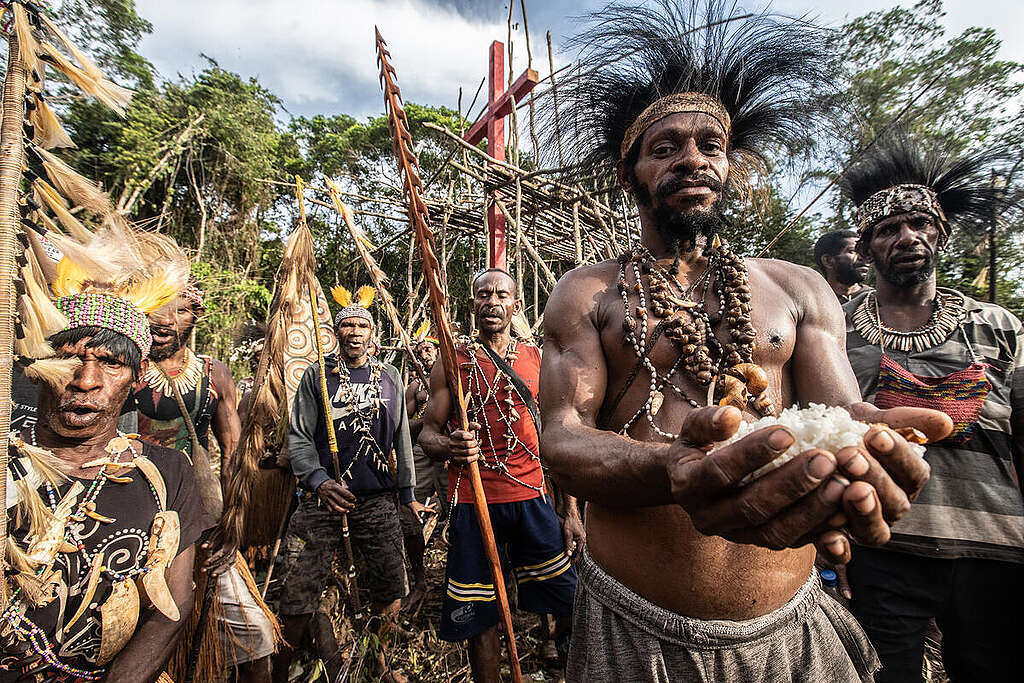Jayapura — Rarely-heard voices today filled a Jayapura courtroom as Indigenous landowners gave evidence in an environmental and land rights lawsuit challenging a Malaysian-owned palm oil company’s plan to clear tens of thousands of hectares of West Papuan forest.
Awyu woman Antonia Noyagi told the court of her people’s forestland management practices, and her fear that destroying the forest to make way for a corporate plantation will impact Awyu women above all others. The women of her home village of Yare in Boven Digoel, South Papua, carry on a practice of going together to work in the forest to strengthen their kinship and cultural practices, Antonia said. She went on to explain that Awyu women depend on intact forests and unpolluted rivers to fulfil their households’ daily needs. On an everyday basis they use their forests and rivers to harvest sago, gather medicinal plants, hunt and fish, and collect firewood for cooking. They also collect valuable agarwood that can be sold for cash to buy outside products.
“I have been supporting nine children alone since my husband died in 2004. Some are still at school, others are studying outside Papua in Java, or have joined the army. We are able to survive because of forest products. Our only hope is from nature. Without a sustainable natural environment we can’t make do,” Antonia said.

Two Awyu men also gave evidence today. The first, Yustinus Bung of the Mukragi/Mukri clan told the court that he had not been given an opportunity to participate in any consultations or been interviewed for an environment and social impact study regarding the plan to clear forest for an oil palm plantation on his land.
Tadius Woro, of the Woro clan whose land is located on the opposite side of the river from the Mukragi/Mukri clan, took his turn in front of the bench to testify that the plaintiff, Hendrikus ‘Franky’ Woro, had been duly chosen as the clan leader and entrusted with the task of taking their struggle for land rights and forest protection to court.
“All members of the Woro clan from our first, second, and third ancestors sat together as is our custom. We appointed Hendrikus ‘Franky’ Woro as the leader of our clan, and agreed the goal to defend our customary land so that the forest and all it contains, including our sacred sites, are not destroyed by the company,” said Tadius, who also brought examples of important forest products such as agarwood, sago powder and shoots, nibung tree shoots and leaves, as well as a number of other medicinal plants to the courtroom as evidence of ongoing traditional use of their land.

Greenpeace Indonesia’s Sekar Banjaran Aji, a member of Franky Woro’s legal team, said: “These three witnesses say that they had only heard talk of a company coming, but had never participated in company or local government outreach. It is certain that the environmental impact assessment (AMDAL) was drafted without the proper involvement and consent of the community. The three witnesses also described the lives of ordinary Awyu people, who do not have ready access to newspapers or the internet, so the announcements that the company claimed to have made regarding their land did not reach them.”
“It’s increasingly clear that the government pays little attention to affected Indigenous communities,” Sekar said.
As set out in Greenpeace International report Licence to Clear, palm oil company PT Indo Asiana Lestari, a part of Malaysia’s Whole Asia Group, has obtained a location permit for an oil palm plantation covering an area of 39,190 hectares.
Contacts:
Sekar Banjaran Aji, Greenpeace Indonesia, +62 812-8776-9880
Tigor Hutapea, Bentala Rakyat Heritage Foundation, +62 812-8729-6684
Igor O’Neill, Greenpeace Indonesia, [email protected] +61-414-288-424
